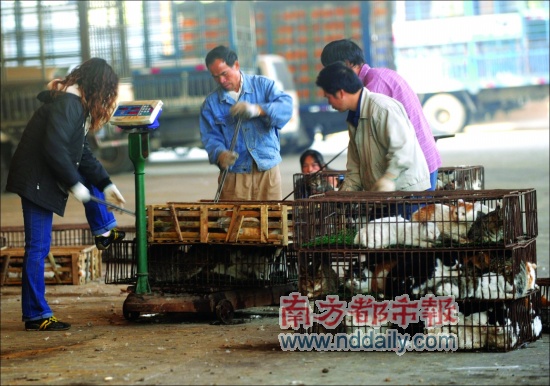 |
|
Dealers weigh cats, which are locked in wooden boxes, at a poultry market in Foshan, Guangdong Province, yeaterday.
|
A media report that thousands of cats are transported daily from Jiangsu province to restaurants in Guangdong has aroused great attention among the public.
Guangzhou-based Southern Metropolis Daily reported yesterday that a cat trafficking group had shipped 1,500 cats from Nanjing, Jiangsu province, to Dongguan, Guangdong, which were then sold restaurants in the city.
The newspaper said the scheme began earlier this month and that thousands of cats were being moved by rail each day.
The cats are caught in Anhui and Jiangsu provinces and sold for 3 yuan (44 cents) to 4 yuan per kilogram to wholesalers in Dongguan, who sell them on for 9 yuan to 14 yuan per kilogram. On the plate, cat meat costs 36 yuan per kilogram.
Many people have condemned the eating of cats, claiming they are human beings' friends.
According to an online survey conducted by the website of Southern Metropolis Daily yesterday, 661 out of the 886 netizens who voted considered dining on cats "ruthless", while 207 said it was okay.
Almost 400 said they have never eaten cats, while 170 said they have or want to try.
"Tears cannot help welling up whenever the scene occurs to me that a pitiful cat is drowned in boiling water and torn apart as delicacy for someone. I just can't imagine how brutal people can be," Tang Xiyuan, a volunteer for an organization for stray animals in Guangzhou, told China Daily yesterday.
"Don't those who dine on cats remember that they used to play with cats in their childhood, and don't they remember how cute and friendly the cats are!" she said.
However, many other citizens seem to be more tolerant.
"I myself don't eat cats; but I don't think eating cats should be forbidden or condemned as long as the behavior is legal and does not cause diseases," Lin Jiaqian, a high school teacher in Guangzhou's Tianhe district, said yesterday.
"All the poultry and livestock are lovely when they are small; and it's equally cruel to kill them," Lin said.
An official with the animal hygiene supervision institute under the provincial health department, who preferred not to be named, told China Daily yesterday that his institution supervises chickens, geese, ducks, horses, cattle, sheep, donkeys, mules, pigs and dogs, but not cats.
"Unless they (the cats) are suspected to have caused an epidemic, I don't think we are in a good position to interrupt the business," he said.
Both the police and industrial and commercial administrators said they will not interrupt the business as long as the businesspeople can produce all the permits and licenses required.
"Eating or trading cats does not violate China's law," Zhang Yuanlong, a lawyer with Guangdong Fucheng Law Firm, said.